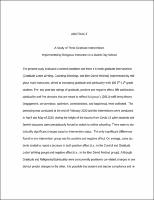Please use this identifier to cite or link to this item:
https://hdl.handle.net/20.500.12202/6725Full metadata record
| DC Field | Value | Language |
|---|---|---|
| dc.contributor.advisor | Pelcovitz, David | |
| dc.contributor.advisor | Novick, Rona | |
| dc.contributor.advisor | Salomon, Laya | |
| dc.contributor.advisor | Goldstein, Aviva | |
| dc.contributor.advisor | Werzberger, Yali | |
| dc.contributor.author | Mark, David | |
| dc.date.accessioned | 2021-04-21T19:34:15Z | |
| dc.date.available | 2021-04-21T19:34:15Z | |
| dc.date.issued | 2021-01 | |
| dc.identifier.citation | Mark, D. (2021, January). A study of three gratitude interventions implemented by religious instructors in a Jewish day school. (Publication No. 28418981) [Doctoral Dissertation, Yeshiva University]. PQDT | en_US |
| dc.identifier.uri | https://hdl.handle.net/20.500.12202/6725 | |
| dc.identifier.uri | https://ezproxy.yu.edu/login?url=https://www.proquest.com/dissertations-theses/study-three-gratitude-interventions-implemented/docview/2525649687/se-2 | |
| dc.description | Doctoral dissertation, Ed.D. / Open Access | en_US |
| dc.description.abstract | The present study evaluated a control condition and three 4-6 week gratitude interventions (Gratitude Letter Writing, Counting Blessings, and Ben David Method) implemented by religious male instructors, aimed at increasing gratitude and spirituality with 109 9th-11th grade students. Pre- and post-test ratings of gratitude, positive and negative affect, life satisfaction, spirituality and five domains that are meant to reflect Seligman’s (2011) well-being theory (engagement, perseverance, optimism, connectedness, and happiness), were collected. The pretesting was conducted at the end of February 2020 and the interventions were conducted in April and May of 2020, during the height of the trauma from Covid 19 when students and Jewish educators were precipitously forced to switch to online schooling. There were no statistically significant changes based on intervention status. The only significant differences found in any intervention group was for positive and negative affect. On average, some students tended to report a decrease in both positive affect (i.e., in the Control and Gratitude Letter Writing group) and negative affect (i.e., in the Ben David Method group). Although Gratitude and Religiosity/Spirituality were concurrently positively correlated, changes in one did not predict changes in the other. It is possible that student and teacher compliance and responses may have been affected by the timing and consequences of the pandemic. The limitations and implications of this study are discussed, and suggestions for future interventions are made. | en_US |
| dc.language.iso | en_US | en_US |
| dc.rights | Attribution-NonCommercial-NoDerivs 3.0 United States | * |
| dc.rights.uri | http://creativecommons.org/licenses/by-nc-nd/3.0/us/ | * |
| dc.subject | Education | en_US |
| dc.subject | Psychology | en_US |
| dc.subject | gratitude | en_US |
| dc.subject | high school | en_US |
| dc.subject | positive | en_US |
| dc.subject | religious | en_US |
| dc.title | A study of three gratitude interventions implemented by religious instructors in a Jewish day school. | en_US |
| dc.type | Dissertation | en_US |
| Appears in Collections: | Azrieli Graduate School of Jewish Education & Administration: Doctoral Dissertations | |
Files in This Item:
| File | Description | Size | Format | |
|---|---|---|---|---|
| Mark David EdD January 2021 OA.pdf | 1.36 MB | Adobe PDF |  View/Open |
This item is licensed under a Creative Commons License

